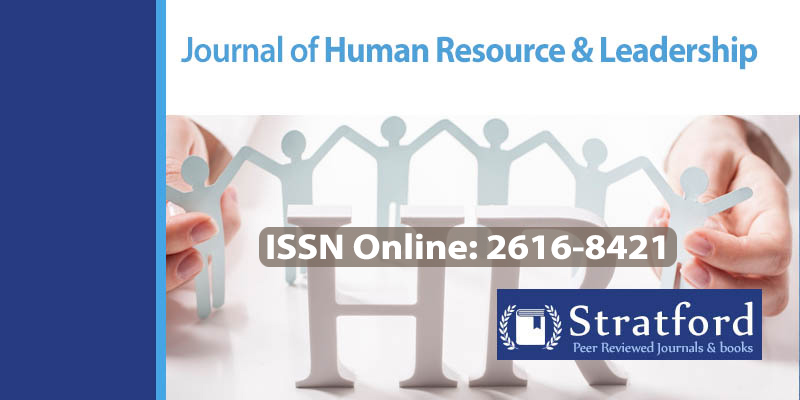The Mediating Effect of Human Resource Management Practices On Relationship Between Leadership Styles and Performance of County Referral Hospitals in Kenya
DOI:
https://doi.org/10.53819/81018102t2520Abstract
This study investigated the mediating effect of Human Resource Management (HRM) practices on the relationship between leadership styles and the performance of county referral hospitals in Kenya. Although leadership has long been recognized as a determinant of organizational success, emerging evidence suggests that its influence on performance may be indirect, operating through internal institutional mechanisms such as HRM systems. The study focuses on three leadership styles, transformational, servant, and adaptive and evaluates how they shape HRM practices, which in turn affect key hospital performance indicators including patient outcomes, quality of care, service accessibility, equity, and financial performance. A cross-sectional survey design was employed, targeting 51 county referral hospitals across Kenya, with structured questionnaires administered to 153 respondents in charge of leadership, HR, and finance functions. Data analysis involved a four-step regression-based mediation model using SPSS, supported by diagnostic tests to ensure validity and reliability. The results indicate that HRM practices partially mediate the relationship between leadership styles and hospital performance. Specifically, leadership styles accounted for 63.2% of performance variance when modeled alone, but this increased to 68.3% when HRM practices were introduced as a mediator. Regression analysis confirmed that leadership significantly influences HRM (R² = 0.524), which in turn significantly predicts hospital performance (R² = 0.507). The inclusion of HRM practices reduced the direct effect of leadership on performance, validating partial mediation. These findings highlight the importance of integrating HRM systems into leadership strategies to achieve optimal performance outcomes in public healthcare institutions. The study recommends institutionalizing responsive HRM frameworks that align with leadership approaches, and strengthening HR practices to fully leverage leadership potential. This research contributes to a deeper understanding of how strategic human resource systems enhance leadership effectiveness and improve public hospital performance in decentralized healthcare environments.
Keywords: Human Resource Management Practices, Leadership Styles, Performance County Referral Hospitals
References
Abubakar, A. M., Elrehail, H., Alatailat, M. A., & Elçi, A. (2020). Knowledge management, decision-making style and organizational performance. Journal of Innovation & Knowledge, 5(2), 104–114.
Alloubani, A., Akhu-Zaheya, L., & Shaker, H. A. (2021). The impact of leadership styles on quality of care measures: A systematic review. International Journal of Health Care Quality Assurance, 34(5), 489–506.
Armstrong, M., & Taylor, S. (2023). Armstrong’s handbook of human resource management practice (15th ed.). Kogan Page.
Ashikali, T., Groeneveld, S., & Kuipers, B. (2021). The role of inclusive leadership in supporting an inclusive climate in diverse public sector teams. Review of Public Personnel Administration, 41(3), 497–519.
Bass, B. M., & Riggio, R. E. (2006). Transformational leadership (2nd ed.). Lawrence Erlbaum Associates.
Becker, G. S. (1993). Human capital: A theoretical and empirical analysis, with special reference to education (3rd ed.). University of Chicago Press.
Bhatti, M. A., Battour, M. M., Ismail, A. R., & Sundram, V. P. K. (2021). Effects of HRM practices on employee performance: The mediating role of servant leadership. European Business Review, 33(2), 322–344.
Council of Governors. (2021). Annual health sector performance report 2020/2021. Nairobi: CoG.
Crook, T. R., Todd, S. Y., Combs, J. G., Woehr, D. J., & Ketchen, D. J. (2011). Does human capital matter? A meta-analysis of the relationship between human capital and firm performance. Journal of Applied Psychology, 96(3), 443–456.
Decramer, A., Smolders, C., Vanderstraeten, A., & Christiaens, J. (2021). HRM and performance in the public sector: Strategic HRM in public organizations. Public Management Review, 23(4), 543–565.
Dubey, R., Gunasekaran, A., Childe, S. J., & Papadopoulos, T. (2021). Examining the role of HRM practices in shaping organizational performance through knowledge sharing and innovation capability. International Journal of Production Economics, 231, 107871.
Greenleaf, R. K. (1970). The servant as leader. The Robert K. Greenleaf Center.
Gupta, V., & Sharma, V. (2020). Relationship between leadership styles and employees’ job satisfaction and organizational commitment: Role of psychological empowerment. Management Research Review, 43(12), 1451–1471.
Heifetz, R. A., Grashow, A., & Linsky, M. (2009). The practice of adaptive leadership: Tools and tactics for changing your organization and the world. Harvard Business Press.
Huselid, M. A. (2021). The impact of human resource management practices on turnover, productivity, and corporate financial performance. Academy of Management Journal, 38(3), 635–672.
Kabene, S. M., Orchard, C., Howard, J. M., Soriano, M. A., & Leduc, R. (2021). The importance of human resources management in health care: A global context. Human Resources for Health, 14(1), 15–25.
Kenya Medical Association. (2020). Status of the health workforce in Kenya: A policy brief. Nairobi: KMA.
Ministry of Health. (2021). Kenya Health Sector Strategic Plan 2021–2025. Nairobi: Government of Kenya.
Munyoki, J., Mulili, B., & Nzulwa, J. (2020). Influence of strategic HRM practices on performance of public hospitals in Kenya. International Journal of Business and Social Science, 11(8), 35–43.
Mwita, K. M., Paul, N. M., & Jackson, M. M. (2021). Employee well-being and job performance in healthcare institutions: The mediating role of HRM practices. African Journal of Human Resource Management, 9(1), 1–10.
Neubert, M. J., Carlson, D. S., Kacmar, K. M., Roberts, J. A., & Chonko, L. B. (2021). The virtuous influence of ethical leadership behavior: Evidence from the field. Journal of Business Ethics, 90(2), 157–170.
Oppel, E. M., Winter, V., & Schreyögg, J. (2021). Determinants of organizational performance in hospitals: A HRM perspective. Health Care Management Review, 46(1), 12–21.
Pfeffer, J. (1998). The human equation: Building profits by putting people first. Harvard Business Press.
Saks, A. M. (2022). A psychological process model of human resource management systems: Implications for research and practice. Human Resource Management Review, 32(1), 100831.
Udin, U. (2024). Leadership styles and sustainable performance: A conceptual review. Journal of Organizational Sustainability, 13(2), 87–99.
West, M. A., Eckert, R., Collins, B., & Chowla, R. (2021). Caring to change: How compassionate leadership can stimulate innovation in health care. International Journal of Leadership in Public Services, 17(1), 45–60.


